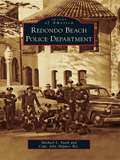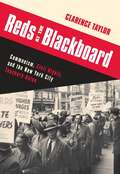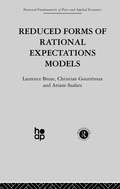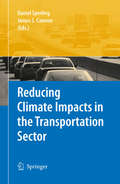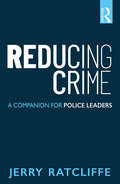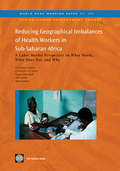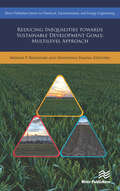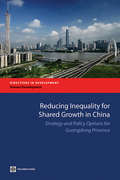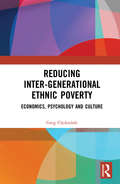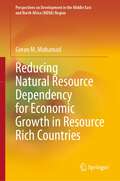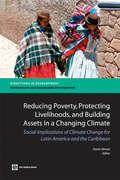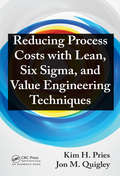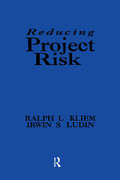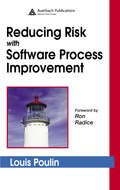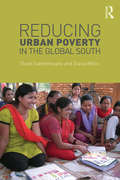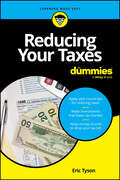- Table View
- List View
Redondo Beach Police Department (Images of America)
by Ret. Capt. Skipper Michael L. StarkThe Redondo Beach Police Department dates to May 9, 1892, when Marshall S. Rogers was appointed as the city's first marshal. One of the first city ordinances prohibited the discharge of firearms within city limits and provided the option for hiring of a deputy "if needed." He was needed, of course, as the city would grow into a major West Coast resort by the 1920s. The department adapted through the changes brought on by the Depression, World War II, and the postwar boom, serving and protecting citizens and fighting crime both unique to beach-city life as well as changing times while enforcing all laws for residents and tourists alike across the dawns of two centuries. In the 21st century, more than 250 sworn officers, support personnel, and volunteers serve one of Southern California's most respected and innovative departments.
Redpath
by Richard FeltoeRedpath, today a household name for sugar in Canada, has its roots in the story of an enterprising Scots immigrant, initially a stone mason and later a building contractor during the boom days of Montreal’s growth from a small provincial centre to a major North American city. <P><P>In 1854, the ever-energetic John Redpath, by then a self-made millionaire in his late fifties, launched a new career as an industrialist. With his son, Peter, and the gifted George Alexander Drummond as manager, he established Canada’s first successful sugar refinery. <P><P>The Redpath story encompasses the influence of sugar as an economic force, the emergence of the elegant social life of cosmopolitan Montreal and a hind-sight view of the complexities of the love-hate relationship between government and business. <P><P>This, the first of two volumes, moves through Canada’s period of extensive industrialization to the turn of the century, the impact of World War I and concludes in the post-war years. Throughout this period, the familiar Redpath trademark, a reproduction of John Redpath’s signature, is a reminder of the heritage inherent in Canada’s business and social history.
Redressing Historical Injustice: Self-Ownership, Property Rights and Economic Equality (Palgrave Studies in Classical Liberalism)
by David Gordon Wanjiru NjoyaThis book offers an alternative to perspectives of distributive justice which fail to resolve economic inequality and exacerbate social problems by ignoring the real causes of inequality. The main impact of the book is to highlight the importance of self-ownership and private property, showing how market participation advances liberty and prosperity. The idea that we should pay reparations to disadvantaged racial groups as compensation for historical injustice is deeply contested. The debates often focus on the practical implications of paying reparations, but overlook more fundamental questions about the meaning of justice. What is justice? What are the implications of wealth redistribution for individual liberty and the rule of law? This book answers these questions through an analysis of classical liberal perspectives in law, philosophy and economics. The book questions whether economic inequality stems from historical injustice, and explores the wider implications of attempting to create equal outcomes through legislative mandates. The book argues that free markets, resting on libertarian rights, are the best way to help disadvantaged members of society and to create the conditions more likely to advance economic equality. The book will be of interest to researchers and students of economics, law, politics and philosophy.
Reds at the Blackboard: Communism, Civil Rights, and the New York City Teachers Union
by Clarence TaylorThe New York City Teachers Union shares a deep history with the American left, having participated in some of its most explosive battles. Established in 1916, the union maintained an early, unofficial partnership with the American Communist Party, winning key union positions and advocating a number of Party goals. Clarence Taylor recounts this pivotal relationship and the backlash it created, as the union threw its support behind controversial policies and rights movements. Taylor's research reaffirms the party's close ties with the union-yet it also makes clear that the organization was anything but a puppet of Communist power.Reds at the Blackboard showcases the rise of a unique type of unionism that would later dominate the organizational efforts behind civil rights, academic freedom, and the empowerment of blacks and Latinos. Through its affiliation with the Communist Party, the union pioneered what would later become social movement unionism, solidifying ties with labor groups, black and Latino parents, and civil rights organizations to acquire greater school and community resources. It also militantly fought to improve working conditions for teachers while championing broader social concerns. For the first time, Taylor reveals the union's early growth and the somewhat illegal attempts by the Board of Education to eradicate the group. He describes how the infamous Red Squad and other undercover agents worked with the board to bring down the union and how the union and its opponents wrestled with charges of anti-Semitism.
Reds or Rackets? The Making of Radical and Conservative Unions on the Waterfront
by Howard KimeldorfWhy is the American working class different? For generations, scholars and activists alike have wrestled with this question, with an eye to explaining why workers in the United States are not more like their radicalized European counterparts. Approaching the question from a different angle, Reds or Rackets? provides a fascinating examination of the American labor movement from the inside out, as it were, by analyzing the divergent sources of radicalism and conservatism within it. Kimeldorf focuses on the political contrast between East and West Coast longshoremen from World War I through the early years of the Cold War, when the difference between the two unions was greatest. He explores the politics of the West Coast union that developed into a hot bed of working class insurgency and contrasts it with the conservative and racket-ridden East Coast longshoreman's union. Two unions, based in the same industry-- as different as night and day. The question posed by Kimeldorf is, why? Why "reds" on one coast and racketeers on the other? To answer this question Kimeldorf provides a systematic comparison of the two unions, illuminating the political consequences of occupational recruitment, industry structure, mobilization strategies, and industrial conflict during this period. In doing so, Reds or Rackets? sheds new light on the structural and historical bases of radical and conservative unionism. More than a comparative study of two unions, Reds or Rackets? is an exploration of the dynamics of trade unionism, sources of membership loyalty, and neglected aspects of working class consciousness. It is an incisive and valuable study that will appeal to historians, social scientists, and anyone interested in understanding the political trajectory of twentieth-century American labor.
Reduce Inequality, Increase Economic Growth: A Conversation with Joseph Stiglitz
by Joseph Stiglitz Shari SpiegelJoseph Stiglitz, winner of the Nobel Prize for Economics, discusses the state of the world's economy in this interview, offering policy interventions to better serve society's economic needs. Pointing to a grave failure of modern macroeconomic theory to predict the financial crisis, Stiglitz calls for new economic models from within the field to build a framework that maximizes individual capacity and advances society's interests.
Reduced Forms of Rational Expectations Models (Fundamentals Of Pure And Applied Economics Ser.)
by L. Broze C. Gourieroux A. SzafarzA comprehensive exposition of rational expectations models is provided here, working up from simple univariate models to more sophisticated multivariate and non-linear models.
ReducedEffort® Changeover: The Lean Way to Quickly Reduce Changeover Downtime, Second Edition
by Ron HeiskellReducedEffort® Changeover: The Lean Way to Quickly Reduce Changeover Downtime provides a step-by-step guide for conducting a Kaizen event that empowers the people who do the work to improve how that work is done. Packed with tips, tools, and examples, this practical guide begins with a clear description of the Lean principles underlying the ReducedEffort Changeover system. In addition, it explains how and why reducing the effort always reduces the time of converting a machine, line, or process from one product to another. In this book, you’ll find everything you need to quickly and dramatically reduce the effort and time of any process using the ReducedEffort method. This is not another book about how to do SMED. Like SMED, ReducedEffort Changeover (REC) does reduce changeover time, but REC is not SMED. SMED, Single Minute (or digit) Exchange of Dies, developed by Dr. Shigeo Shingo, has been the process used for many years by countless manufacturing plants to reduce changeover time. The SMED process was used in Toyota to reduce the changeover of a 1,000-ton stamping press from four hours to three minutes. As a Lean-based process, the REC system focuses on reducing the labor, not the time, involved in changing over a machine to work on a different product. With REC, there are no Standard Operation Combination Sheets to fill out and no Problem Identification Sheets to complete, and it does not require the arduous chore of timing every task, as SMED does. Very little capital investment is required with REC. Unlike SMED, it does not require management-approved funding to achieve substantial results. Because REC is not capital-driven, management does not need to drive the process. The operators will drive the process because it reduces their labor. One of the biggest advantages of REC over SMED is that operators will readily accept the process, and more important, they will want to sustain it. The reason for this is quite simple and will become evident when the REC process is defined. REC takes SMED to a new level that is easier and faster both to implement and to deliver sustainable results.
Reducing Climate Impacts in the Transportation Sector
by James S. Cannon Daniel SperlingMore than 250 experts from around the world gathered at the Asilomar Transportation and Energy Conference in August 2007 to tackle what many agree is the greatest environmental challenge the world faces: climate change. This 11th Biennial Conference, organized under the auspices of the Energy and Alternative Fuels Committees of the U.S. Transportation Research Board, examined key climate change policy issues and strategies to combat climate impacts from the transportation sector, a leading source of greenhouse gas emissions. This book includes chapters by leading presenters at the Asilomar Conference that reflect the most current views of the world's experts about a critical and rapidly evolving energy and environmental problem. The chapters in this book examine increasing worldwide emissions of greenhouse gases, uncertain oil supply, evolving climate change science, public attitudes toward climate change, and the implications for the U.S. of growth in China, India and elsewhere. They propose methods to reduce growth in vehicle travel through alternative fuel, new technologies, and land use planning. They examine the costs and the potential for greenhouse gas reduction through deployment of advanced technology and alternative fuels and propose strategies to motivate consumers to buy fuel efficient and alternative fuel vehicles, including heavy duty trucks.
Reducing Crime: A Companion for Police Leaders
by Jerry RatcliffeHow do I reduce crime in my police command? How do I tackle chronic crime problems? How do I address the long-term issues that have plagued my community? How do I analyze crime and criminal behaviour? How do I show evidence of success in crime reduction? What works, what doesn’t, and how do we know? Providing answers to these questions and more, this engaging and accessible book offers a foundation for leadership in modern policing. Blending concepts from crime science, environmental criminology, and the latest research in evidence-based policing, the book draws on examples from around the world to cover a range of issues such as: how to analyze crime problems and what questions to ask, why the PANDA model is your key to crime reduction, key features of criminal behavior relevant to police commanders, the current research on what works in police crime prevention, why to set up systems to avoid surprises and monitor crime patterns, how to develop evidence of your effectiveness, forming a crime reduction plan, tracking progress, and finally, how to make a wider contribution to the policing field. Crammed with useful tips, checklists and advice including first-person perspectives from police practitioners, case studies and chapter summaries, this book is essential reading both for police professionals taking leadership courses and promotion exams, and for students engaged with police administration and community safety.
Reducing Geographical Imbalances of Health Workers in Sub-Saharan Africa: A Labor Market Perspective on What Works, What Does Not, and Why
by Agnes Soucat Christophe Lemiere Negda Jahanshahi Ellen Smith Christopher HerbstThe human resources crisis in the health sector has been gathering attention on the global stage. To date, however, most of this attention has focused on shortages of health human resources (HRH) at the national level. At least as important are problems at the sub-national level. Massive geographic and skill mix imbalances are reflected in the perilous undersupply of HRH in most rural areas. Virtually all Sub-Saharan African countries suffer from significant geographic imbalances. Very little substantive information or documentation exists on the problem. Even less is known about the lessons from policies aimed at addressing urban-rural human resource imbalances, let alone experiences of Sub-Saharan Africa countries, with such policies. There also appears to be a disconnect between the objectives and efforts of policymakers on the one hand and the functioning of national health labor markets and labor market behavior on the other hand. This disconnect hinders policy effectiveness and the efficient utilization of resources intended to narrow urban-rural inequities. In Sub-Saharan Africa government policies, often limited to the management of public sector vacancies, appear to be elaborated, prescribed, and implemented independently of labor market considerations. Partly as a result, they are unable to effectively address urban-rural imbalances, which are an outcome of labor market dynamics. This report discusses and analyzes labor market dynamics and outcomes (including unemployment, worker shortages, and urban-rural imbalances of categories of health workers) from a labor economics perspective. It then use insights from this perspective as a basis for elaborating policy options that incorporate the underlying labor market forces. The goal of the study is to address undesirable outcomes (including urban-rural HRH imbalances) more effectively. The book is thus suitable for researchers, policy analysts and policy makers with an interest in understanding and improving the allocation of human resources for health in the developing world.
Reducing Gun Violence: Results from an Intervention in East Los Angeles
by Greg Ridgeway K. Jack Riley Clifford A. Grammich George Tita Allan AbrahamseTo assess whether an initiative to reduce gun violence that had been successful in Boston could be adapted for use elsewhere, researchers selected an East Los Angeles area for a similar intervention that was to include both law enforcement and social service components. Although the latter component was not widely available when the intervention began, researchers found that the intervention helped reduce violent and gang crime in the targeted districts and that crime also decreased in surrounding communities.
Reducing Inequalities Towards Sustainable Development Goals: Multilevel Approach
by Medani P. BhandariThe Sustainable Development Goals (SDGs) are a set of global goals that meet some of the most pressing challenges facing our world today. Goal 10 concerns reducing global inequalities. Inequality is currently seen in the social, political, and economic structures of communities at both the national and international level. The United Nation’s approach to sustainable development is to create a set of goals and targets try to minimize the accelerating gaps of inequality. The book presents new insights for evaluating the progress on SDGs (especially goal 10), it also boldly sets new economic, social and environmental targets for reducing inequality. Using case studies, this book encourages readers to view economic development through the lens of growing inequalities and disparities. Such inequalities are clearly becoming more obvious as the world is better connected, and information is quickly shared. The books main aim is therefore to direct the efforts of scholars, practitioners and policymakers to swiftly find the balance between the three pillars of sustainable development. The main challenges and focus of each chapter are different and collectively they give an integrated understanding of the phenomenon of sustainable development and its diverse aspects. This book will be useful for policymakers, social and environmental activists, agencies, educators and practitioners in the sphere of social or environmental economics. The methodology of the research can be replicated and taken forward by future researchers in the field.
Reducing Inequality for Shared Growth in China
by The World BankGuangdong, a province of over 93 million residents, is located on the southern coast of China, boarding with Hong Kong, China. As China's powerhouse for economic growth and a pioneer of reform and opening up, Guangdong has maintained an annual average GDP growth rate of 13.7 percent over the past three decades. Its historical achievements notwithstanding, Guangdong witnessed increased inequality and regional disparity. To assist the authority in developing a strategy for the new phase of reforms that promotes more inclusive and sustainable growth, Reducing Inequality for Shared Growth in Guangdong Province recommends a three-pillar approach: eliminating absolute poverty, reducing inequality in opportunities, and containing inequality in outcomes. The book also proposes a range of policy actions in these three broad areas. First, to further develop the social assistance program (i.e. the minimum living allowance program ) to address the issue of absolute poverty; Second, to improve income opportunities of the rural poor by better facilitating rural labor migration to non-farming jobs and urban labor markets, deepening rural finance reform, and providing better protection of their rights over land. Third, to invest in people through more equitable access to and financing of social services such as basic education, skills development, and health care. Further reform of the intergovernmental fiscal system is essential to the success of these efforts. This report will be of interest to central and sub-national policy makers, policy implementing agencies, researchers, development partners, and others working on economic and social development in China and in other countries. Guangdong's experience will offer great value to the rest of China and to other countries that are grappling with similar development challenges.
Reducing Inter-generational Ethnic Poverty: Economics, Psychology and Culture (Education, Poverty and International Development)
by Greg ClydesdaleThis book looks at human capital development and provides an explanation for why cognitive development varies among ethnic groups. The book uses an interdisciplinary approach to examine inter-generational ethnic poverty. It puts forth an argument that the ethnic poverty gap can be reduced, and to do so we need a broader view of human capital which considers the match between the nature of the economy and the specific capabilities needed. The book focuses on the interrelationship between developmental psychology and socio-economic status and argues that the most important relationship in a knowledge economy is actually the one between a parent and a child. The book begins by looking at cultures and assimilation and investigates the link between education, culture and socio-economic status. It also attempts to answer the question of what the link between culture, parents and children’s ability is and why ethnic groups vary in their nurturing. It delves into how parenting and cognitive development are interrelated. This thought-provoking book concludes with an emphasis on nurture and how it may alleviate ethnic poverty and shape social policies. The book provides a strong thesis to counter explanations based on racial and genetic superiority.
Reducing Natural Resource Dependency for Economic Growth in Resource Rich Countries (Perspectives on Development in the Middle East and North Africa (MENA) Region)
by Goran M. MuhamadThis book examines the reduction of natural resource revenue dependency in resource-rich countries. Such countries experience lower economic growth due to factors of high volatility in commodity prices, reduction in accountability, undermining of the competitiveness of other economic sectors, and weak power of institutions. The analysis is based on an identified gap in the literature regarding how private sector development and public sector development affect the degree of dependency on resource revenue in natural resource-rich countries.This book studies the interaction between private and public sector development with dependency on natural resources, specifically exploring whether the two diversified factors lead to a decrease in the degree of dependency, which is important for economic growth and to overcome the "resource curse". Economic diversification is viewed as a long-term solution to the high economic dependency from natural resources. Private sector development and public sector reforms may lead to this diversification.The analysis of the book helps to shed light on private sector development, public services sector privatization, and a taxation system to diversify sources of income, with the objective to reduce dependency on natural resources extraction.This book is an invaluable read for public policymakers, the public and private sectors, law makers, and scholars of developmental studies.
Reducing Poverty and Sustaining the Environment: The Politics of Local Engagement
by Stephen Bass David Satterthwaite Hannah Reid Paul Steele'A valuable contribution to our collective knowledge about governance, poverty and the environment' Frances Seymour, World Resources Institute 'Detailed and realistic documentation of contemporary development and governance relationships and trends' Melissa Leach, Institute of Development Studies There are growing signs that development work by governments, aid agencies and non-government organisations ignores the fact that environmental quality matters to the poor. There are also indications that some environmental work is pushing 'people-out' protection methodologies. Yet recently, an extensive range of project, programme and policy level activities has focused attention on the important links between poverty and the environment, and the benefit of entrenching these links in policy-making processes at all levels. The role that politics plays in all of this is of overriding importance. This volume is the first to address the role of politics in environmental issues that matter to the poor through a series of case studies. It describes experiences at regional, national and local levels in low and middle income countries including China, Tanzania, Nigeria, South Africa, Pakistan, Colombia, Peru, India, Saint Lucia and countries in East Africa. Ultimately the book demonstrates how understanding the national and local political context is crucial for addressing poverty-environment issues such as environmental health, access to natural resources for livelihoods and security, and coping with environmental disasters. The editors advocate ways in which political processes can be used to make positive changes - from the perspectives of both poverty reduction and the environment.
Reducing Poverty, Protecting Livelihoods, and Building Assets in a Changing Climate
by Dorte VernerClimate change is the defining development challenge of our time. More than a global environmental issue, climate change and variability threaten to reverse recent progress in poverty reduction and economic growth. Both now and over the long run, climate change and variability threatens human and social development by restricting the fulfillment of human potential and by disempowering people and communities in reducing their livelihoods options. Communities across Latin America and the Caribbean are already experiencing adverse consequences from climate change and variability. Precipitation has increased in the southeastern part of South America, and now often comes in the form of sudden deluges, leading to flooding and soil erosion that endanger people's lives and livelihoods. Southwestern parts of South America and western Central America are seeing a decrease in precipitation and an increase in droughts. Increasing heat and drought in Northeast Brazil threaten the livelihoods of already-marginal smallholders, and may turn parts of the eastern Amazon rainforest into savannah. The Andean inter-tropical glaciers are shrinking and expected to disappear altogether within the next 20-40 years, with significant consequences for water availability. These environmental changes will impact local livelihoods in unprecedented ways. Poverty, inequality, water access, health, and migration are and will be measurably affected by climate change. Using an innovative research methodology, this study finds quantitative evidence of large variations in impacts across regions. Many already poor regions are becoming poorer; traditional livelihoods are being challenged in unprecedented ways; water scarcity is increasing, particularly in poor arid areas; human health is deteriorating; and climate-induced migration is already taking place and may increase. Successfully reducing social vulnerability to climate change and variability requires action and commitment at multiple levels. This volume offers key operational recommendations at the government, community, and household levels with particular emphasis placed on enhancing good governance and technical capacity in the public sector, building social capital in local communities, and protecting the asset base of poor households.
Reducing Process Costs with Lean, Six Sigma, and Value Engineering Techniques
by Jon M. Quigley Kim H. PriesA company with effective cost reduction activities in place will be better positioned to adapt to shifting economic conditions. In fact, it can make the difference between organizations that thrive and those that simply survive during times of economic uncertainty. Reducing Process Costs with Lean, Six Sigma, and Value Engineering Techniques covers
Reducing Project Risk
by Ralph L. Kliem Irwin S. LudinWhat are my chances of completing this project successfully? What could prevent me? How can I anticipate potential threats? These are the kinds of questions you are likely to ask yourself when you become responsible for an important project. And these are the kinds of question Reducing Project Risk will help you answer. Drawing on examples from a variety of business activities as well as on their own extensive experience, the authors propose a systematic approach to dealing with risk. They provide both a conceptual framework and the practical techniques for identifying, analysing and controlling risks of any type. Among other things you will learn: ¢ how to carry out an objective review of the factors involved ¢ how to recognize the warning signs so that you can head off trouble before it strikes ¢ how to take care of the 'people side' of project management. Here is a book that will be welcomed not just by professional project managers but by anyone using human and material resources to accomplish a complex task.
Reducing Risk with Software Process Improvement
by Louis PoulinReducing Risk with Software Process Improvement recommends the critical practices that aid in the successful delivery of software products and services. The author describes the observations that he made over a period of ten years in IT projects and organizations. He focuses on the areas of software development and maintenance, highlighting the mos
Reducing Risks with Safeguards: Techniques for Guarding Against the Mental Distortions that Lead to Bad Decisions
by Sydney Finkelstein Jo Whitehead Andrew CampbellThe Bay of Pigs was a military and political fiasco, but President Kennedy learned from his mistake and created a process that reduced the risk of a flawed decision when faced with the Cuban Missile Crisis the following year. He recognized the potential to prejudge the situation, draw on misleading experiences, and be over-influenced by self-interest, so safeguards were put in place to guide his decision making. Safeguards can involve a wide range of interventions, process changes, people choices, analytical techniques, and other mechanisms that can be introduced to reduce the risk of flawed decisions. While every organization has some sort of process to manage decisions, safeguards are additional measures. In this chapter, the authors describe four categories of safeguards that fortify the decision making process. This chapter was originally published as chapter 9 of "Think Again: Why Good Leaders Make Bad Decisions and How to Keep It From Happening to You."
Reducing Urban Poverty in the Global South
by David Satterthwaite Diana MitlinUrban areas in the Global South now house most of the world’s urban population and are projected to house almost all its increase between now and 2030. There is a growing recognition that the scale of urban poverty has been overlooked – and that it is increasing both in numbers and in the proportion of the world’s poor population that live and work in urban areas. This is the first book to review the effectiveness of different approaches to reducing urban poverty in the Global South. It describes and discusses the different ways in which national and local governments, international agencies and civil society organizations are seeking to reduce urban poverty. Different approaches are explored, for instance; market approaches, welfare, rights-based approaches and technical/professional support. The book also considers the roles of clientelism and of social movements. Case studies illustrate different approaches and explore their effectiveness. Reducing Urban Poverty in the Global South also analyses the poverty reduction strategies developed by organized low-income groups especially those living in informal settlements. It explains how they and the federations or networks they have formed have demonstrated new approaches that have challenged adverse political relations and negotiated more effective support. Local and national governments and international agencies can become far more effective at addressing urban poverty at scale by, as is proposed in this book, working with and supporting the urban poor and their organizations. This book will be an invaluable resource for researchers and postgraduate students in urban development, poverty reduction, urban geography, and for practitioners and organisations working in urban development programmes in the Global South.
Reducing Your Taxes For Dummies
by Eric TysonGet year-round insight on reducing tax burdens This book walks you through the best strategies for reducing your personal tax burden and keeping more dollars in your pocket. If you plan and manage your finances all year round, tax season can be a cakewalk. Reducing Your Taxes For Dummies offers tips on maximizing your deductions, minimizing your income tax, and hunting for breaks on investment, real estate, and business income tax. Written by Dummies financial guru Eric Tyson (Personal Finance For Dummies, Taxes For Dummies), this guide explains tax basics, savings plans, retirement accounts, and myriad ideas for reducing your personal tax burden. Understand filing status, child tax credits, alternative minimum tax, IRS audits, and beyond Avoid common tax mistakes and identify all your possible deductions Plan and invest in a tax-wise way throughout the year Make the most of your retirement accounts and savings plans Keep your hard-earned cash with Reducing Your Taxes For Dummies. It's full of year-round opportunities for reducing your tax burden and paying less in taxes each year.
Reducing the Effects of Climate Change Using Building-Integrated and Building-Applied Photovoltaics in the Power Supply (Innovative Renewable Energy)
by Ali SayighThis book looks at the success and continuing potential of photovoltaic (PV) technology in combating climate change by harnessing solar energy through building-integrated (BIPV) and building-applied photovoltaics (BAPV). With PV global capacity soaring from 940 GW in 2021 to 1100 GW in 2022 and projected to reach 1456 GW by the end of 2023, the world is witnessing an unprecedented shift towards renewable energy solutions. Today, no single country exists without some form of PV installation, driven by reduced costs and abundant free sunshine. The book’s chapters delve into the advancements in PV technology, exploring its integration as an essential building material by examining 14 countries and regions – Brazil, The Netherlands, Austria, Poland, Argentina, Iran, Germany, Malaysia, Oman, Bahrain, India, Australia, the United Kingdom, and Egypt – and providing a comprehensive overview of their successful adoption of PV for electricity generation. Whether you’re an architect, builder, engineer, or climate advocate, this vital resource offers insights, international case studies, and a path to a greener future.
